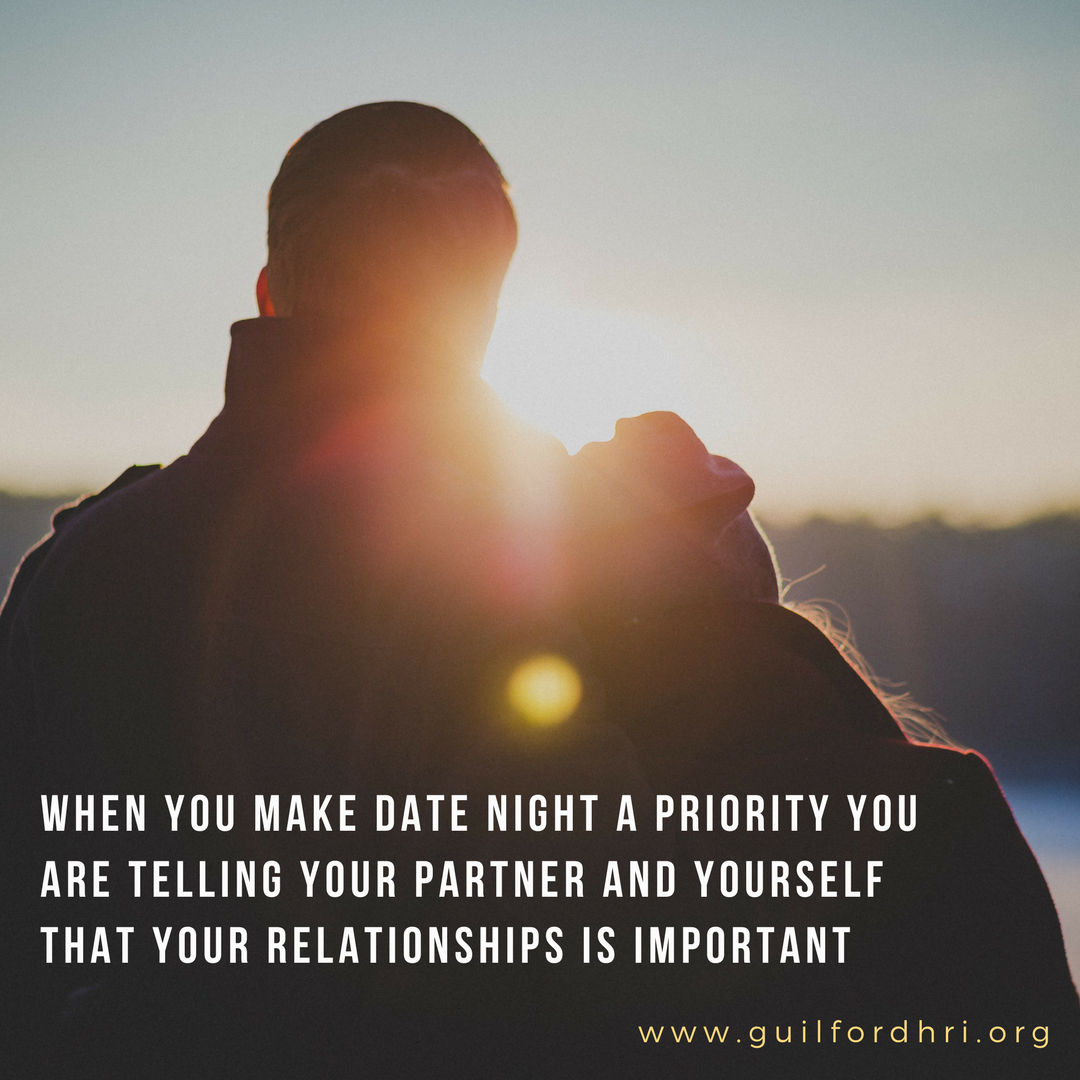
A Night Away from Life’s Demands

A night away from life’s demands and with the person you care for can be a great way to recharge. After enough regularly scheduled date nights, you’ll find yourself looking forward to date night, even if getting it scheduled can present challenges. Making this time for your relationship is important!
Be Creative with Date Night

Going to the same restaurant week after week could get old pretty quickly. One way to keep date night fun and exciting is to be creative! Perhaps there’s a new restaurant, a new museum that opened or a movie your partner has been wanting to see. These are all possible options that could keep your date night eventful and fresh without getting mundane. You certainly don’t have to do anything extravagant week after week but a small change in routine could go a long way. Next date night, maybe stay home and try that new recipe you saw online or pull out the board games when the kids have gone to bed.
Putting Distractions Away

The purpose of a date night is to spend intimate time alone with your partner. The focus of the night should be you and your partner. That means put away the distractions. Things like cell phones, social media and work should be put away until the end of the date. For one night, putting distractions away will help create an even more memorable and enjoyable date night.
Personal Time Together

No matter if you’ve been together for 1 year, 5 years, or 45 years, maintaining personal time together should be important.
Your Relationship Is Important

It is incredibly easy to get overwhelmed with life’s demands that your relationship can get pushed to the side. However, when you make date night a priority you are telling your partner and yourself that your relationship is important.
Making Date Night a Priority! Series Introduction

By Lavender Williams, HRI Program Specialist
Do you remember your very first date with your partner? How nervous you were? How long it took you to find that just right outfit? Perhaps you were so nervous you were afraid the other person would notice your sweaty palms or bouncing leg underneath the table. Or, perhaps you were so excited you talked uncontrollably and couldn’t stop smiling afterwards. Either way, I’m sure you would say that was an exciting and emotional time.
Dating is about getting to know the other person as much as possible. During this stage, perhaps you see each other a few days a week. You go out of your way to squeeze in a lunch date, a late night dinner or a casual Saturday walk. You simply can’t wait to see that person, continue to learn about them and grow your relationship. The dating stage is arguably one of the best stages of a romantic relationship. We at HRI believe it should also be a stage your relationship never exits.
Dating is not only about getting to know where the person was born, their most embarrassing memory or how many kids they want to have. It’s also about cultivating and maintaining romance and intimacy in the relationship. Especially if you’ve been in the same relationship for a significant amount of time, you have seen both you and your partner develop and change overtime. Taking time out to spend an evening with each other will give you opportunities to learn about those changes. As people are constantly changing and evolving, so should your relationship.
Yes, I’m very aware you have a lot on your schedule as it is. That is a common reason many couples don’t spend much time alone with each other. Between work, kids, grocery shopping, and community events it can be nearly impossible to find time for a night out with your partner. The way to combat these priorities is to add your relationship to the list of priorities. Making date nights a priority is a way to ensure you make time to get dinner, go for a walk, or see a movie.
We at HRI are passionate about improving relationships and we recognize that as time goes on in relationships, couples can get complacent. As demands pile up and routines develop, date night drops lower and lower on the list of things to do. We want to help you find ways to bring date night back into your relationship or improve it. Over the next few days, we will be sharing additional tips on date night. We hope you take some of these tips and integrate them into your relationship and recognize the importance of date night.
#FindHelpFriday – Be Still Counseling

This week’s featured #FindHelpFriday resource is Be Still Counseling, a private counseling practice in Greensboro that offers a naturalistic and transformative approach to trauma and adverse experiences healing. Be Still Counseling is operated by Rachel Hutto, MS, Ed.S., LPC. To hear from Rachel with more information about Be Still Counseling, check out the video below:
To contact Be Still Counseling, please visit their web-site at http://www.bestillpllc.com/ or call 803.707.4682.
Keep Those Conversations Going!

Having positive, ongoing communicating with teens is possible! It can take some time to figure out the best ways to connect and talk with your teen, but it’s well worth the investment in your teen’s health and wellbeing to build and maintain a strong, positive relationship with your child during the teen years! Although our “Talking with Teens” series is coming to an end, we invite you to keep the conversation going by checking out the resources in our HRI Toolkit for Parenting Teens: http://www.guilfordhri.org/community-resources/toolkits/toolkit-for-parenting-teens/.
Don’t Have “The Talk”
By Christine Murray, HRI Director
For many parents, thinking about having “the talk” with their children about sex is sure to induce a lot of anxiety and stress. As much as parents want to help guide their children, especially as teenagers, toward healthy decisions regarding their sexuality, there can be a lot of pressure around having “the talk.”
One of the reasons that “the talk” can be so anxiety provoking is because of how it’s conveyed as a one-time occurrence. Parents may feel like they have one chance to get it right, and hopefully it won’t be too awkward for them or their children!
What if there was an alternative to having “the talk”? What if parents could forget about having a one-time conversation about sex and move toward having a series of ongoing conversations that evolve in a way that corresponds with their children’s changing needs, questions, and developmental stages?
This alternative is exactly the approach that is best suited to help parents talk with their children and teens about sex and sexuality in today’s world. Not only do children’s needs and questions change related to this topic, but the world around us is changing as well, and there has perhaps never been a more important time for parents to be intentional about talking with teenagers about sex and sexuality.
April is Sexual Assault Awareness Month, but this year has been unique in that issues related to sexual assault, harassment, and abuse have been in the media for a prolonged period of time due to the #MeToo movement and the cascade of recent news reports of sexual harassment in the entertainment industry. Whether parents like it or not, teenagers are hearing about unhealthy aspects of sexuality very often, and parents can play an important role in helping their children process these news stories and learn how to build a safe, healthy sense of sexuality in today’s world.
Below are eight tips to open the door to a helpful, ongoing conversation about sex and sexuality as you parent teenagers:
- First, get clear about the values and information that are most important to you to convey about sexuality to your teen. What are your long-term goals for how you’d like your teen to understand sex and sexuality? It may be helpful to journal about this or talk with your partner or a trusted friend to help you figure this out. Although you need to address your teen’s immediate questions and concerns, it’s also important to think about your hopes for their future life and relationships, and consider how the topics you discuss today are laying a foundation for their future development as a person and in relationships.
- Second, take time to learn about the sexuality-related topics that teens today face. Although some things never change, there are a lot of new issues that parents today either didn’t face or weren’t discussed when they were teenagers. For example, today’s teens need to learn about consent and how to navigate the technology-related aspects of sexuality and relationships. Parents need to understand these topics to be able to discuss them with their teens.
- Third, let your teen know there’s an open door to talking about sex and sexuality with you. Before you even start talking about specific topics, spend time talking about how you know this is a difficult topic to talk about, but that it’s important that they know they can come to you at any time with questions or to talk through any specific situations they are facing.
- Fourth, start with some more basic, less-threatening topics to build a foundation of trust and safety for these conversations. Consider what topics are less anxiety-provoking for both of you, and start there. You don’t need to dive into really difficult conversations right away. You might start talking simply about dating relationships and what a healthy relationship looks like. These more basic conversations can show your teen that you’re a trusted source of wisdom and information on topics related to sexuality.
- Fifth, be mindful of your reactions when your teen asks questions or shares what they know. If you overreact if your teen discloses something or asks a question, that can shut them down for future conversations. Even if something your teen asks or says is upsetting or scary to you, try to respond calmly, keep listening, and not jump immediately into a long lecture on the topic. Your teen will be more likely to open up to you the next time if they see that they can talk to you without you getting upset or angry.
- Sixth, if you are concerned about your teen’s health or safety, speak up, but do it carefully. Some parents may be so concerned about shutting down a conversation with their teen that they become afraid of challenging a teen’s behavior that they know is unsafe or risky. Having an open door of communicating about sex with your teen doesn’t mean you get to let them do or say anything they want to do. If your teen is engaging in risky sexual behaviors, let them know you are concerned and the reasons for your concern. Remember that many teens have a sense of invincibility, so they may not fully appreciate what you tell them about the risks associated with their behaviors. So, you may need to share your concerns repeatedly, but you can always reassure your teen that you’re there for them, that you aren’t trying to shame them, but that you do want the best for them.
- Seventh, be willing to say, “I don’t know,” but then help find the answer. One of the fastest ways to hurt your credibility as a trusted source of information about sex and sexuality with your teen is to provide them with inaccurate information. Be willing to admit when you come to the end of your knowledge, and suggest that you and your teen search for more information together, such as by searching for information online or by speaking with a local professional.
- Eighth, address media in your conversations. Teens are heavily connected to many different types of media, including music, television and movies, and social media. It’s important to talk with your teen about how they see sex and relationships portrayed in the different sources of media they encounter throughout their days. Help them develop media literacy so they understand how what they’re seeing in the media compares to reality.
As a parent, you play an important role in shaping your teen’s views about sex, sexuality, and relationships. Although “the talk” is often an anxiety-provoking aspect of parenting teens, you can alleviate a lot of pressure by viewing it as an ongoing dialogue, rather than a one-time event. By keeping an open door to conversations about sex and sexuality with your teen, you are offering a foundation for them to navigate this often complicated and perplexing part of their growth into adulthood.

